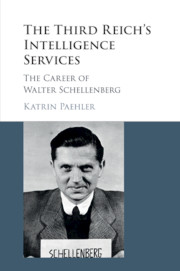Book contents
- Frontmatter
- Dedication
- Contents
- List of Figures
- Acknowledgments
- Archives
- Introduction
- 1 Gaining a Foothold
- 2 Rising Star
- 3 Intelligence Man
- 4 Office VI and Its Forerunner
- 5 Competing Visions: Office VI and the Abwehr
- 6 Doing Intelligence: Italy as an Example
- 7 Alternative Universes: Office VI and the Auswärtige Amt
- 8 Schellenberg, Himmler, and the Quest for “Peace”
- 9 Postwar
- 10 Concluding Thoughts
- Appendix
- Glossary
- Index
9 - Postwar
Published online by Cambridge University Press: 31 March 2017
- Frontmatter
- Dedication
- Contents
- List of Figures
- Acknowledgments
- Archives
- Introduction
- 1 Gaining a Foothold
- 2 Rising Star
- 3 Intelligence Man
- 4 Office VI and Its Forerunner
- 5 Competing Visions: Office VI and the Abwehr
- 6 Doing Intelligence: Italy as an Example
- 7 Alternative Universes: Office VI and the Auswärtige Amt
- 8 Schellenberg, Himmler, and the Quest for “Peace”
- 9 Postwar
- 10 Concluding Thoughts
- Appendix
- Glossary
- Index
Summary
Amt VI was a world of illusion and naivety, not of sinister design; but, unlike the old Abwehr, its illusions were powerfully represented and contributed to the general ruin. Himmler believed in Schellenberg until the end.
The Geheime Meldedienst was a fiction of Schellenberg's own mind, and he had neither the time nor the official support necessary to make it a reality.
Counter Intelligence War Room London War Room Monthly Summary No. 4 July 23, 1945Schellenberg was neither unprepared for the future when he arrived in neutral Sweden nor alone for long. Outwardly still negotiating the cessation of hostilities in Scandinavia, or, more precisely, German surrender there, he was soon joined by several companions. His secretary Marie-Luise Schienke, her assistant Christl Erdmann, SS-Obersturmbannführer Heinz Renau, Renau's wife and daughter, and Franz Göring arrived in Sweden on May 6–7,1945. Schellenberg's family – his pregnant wife and three children under four – remained in Bavaria; his recent activities had not included fetching them. The group arrived in Stockholm with some means: enough cash to pay salaries for three months and a forged US passport for Schellenberg. As the Swedes furnished him with papers, this item was not needed. The group clearly had no intention of returning to Germany anytime soon. Schellenberg had “quit Germany.”
Between May 5 and 7, Schellenberg, true to his mandate, engaged in negotiations about the surrender of the German troops in Norway with representatives of the Swedish Foreign Office. He also still tried to arrange for a meeting with Eisenhower, claiming that he had received instructions to do so from Schwerin von Krosigk. No such meeting was forthcoming. The Dönitz government had established direct contact with the Allies for the purpose of surrender and the Swedes kept Allies representative abreast of Schellenberg's activities and “ongoing activities.” An end run by Schellenberg that excluded the Soviets had little chance, even though there was no lack of trying. Interestingly, arranging the surrender of the German troops in Norway turned out to be more difficult than expected. General Franz Böhme was unwilling to give up and have his troops interned; was hard to reach by phone; did not take a meeting with visiting German Minister Hans Thomsen; and doubted Schellenberg's authority.
- Type
- Chapter
- Information
- The Third Reich's Intelligence ServicesThe Career of Walter Schellenberg, pp. 317 - 343Publisher: Cambridge University PressPrint publication year: 2017

